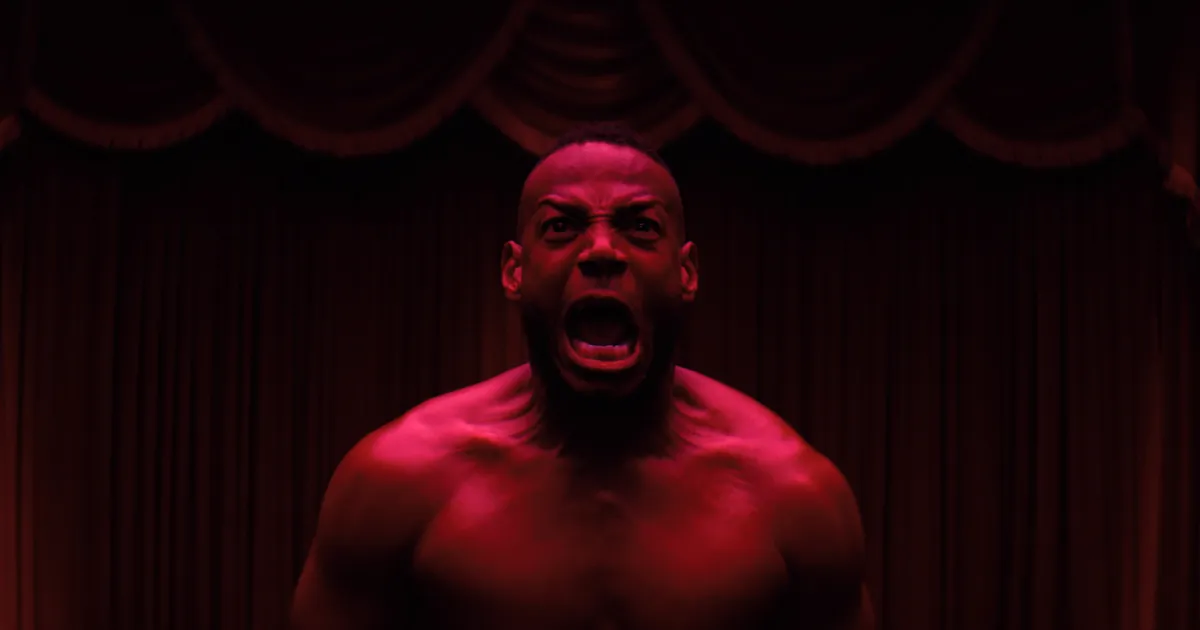
The basic premise of Him is so fun that I’m half-hoping someone else takes the idea and makes a different movie out of it. An injured up-and-coming rookie football quarterback is invited to work out with a veteran championship quarterback who may or may not be on the edge of retirement. Under increasingly absurd and nightmarish circumstances, it becomes clear the veteran isn’t ready to cede the stage for the younger man. It’s a roided-out All About Eve meets Any Given Sunday meets, I dunno, The Wicker Man.
Or it could have been, at any rate.
Him’s marketing has Jordan Peele’s name all over it as producer, but it was actually directed by Justin Tipping, whose previous feature was the ultrastylized 2016 indie movie Kicks. Tipping has been working in the TV salt mines since then, which might explain why in Him he throws every cinematic trick in the book at us; maybe he needs an outlet for all that creative energy. The movie at times plays like a high-budget student film: It’s eager to impress us with technique.
And it does, at least until we realize that there’s not much else going on. Billed somewhat misleadingly as a football horror movie, Him has plenty of striking imagery. It takes place mostly at the enormous desert compound of football legend Isaiah White (Marlon Wayans), the multiple-MVP-winning quarterback of the San Antonio Saviors. (Sample slogan: “Defend the Righteous.”) The place, all cavernous rooms filled with Roman statues and pagan imagery, looks like the lair of a ’70s Bond villain. Outside, things look downright dystopian. We’re told die-hard Saviors fans are more like a cult than anything else, and they look it: A gaggle of them camp outside the gates of the compound in the baking hot sun like castaways from a Mad Max picture. It might have even been one of these crazed and costumed fans (dressed either as a goat or a demon, or some horned thing in between — the ambiguity is intentional, surely) who assaulted Cameron Cade (Tyriq Withers), a college stud bound for the big leagues, whose resulting head injury now raises questions about his professional future. But now that he has something to prove, Cam is eager to come to Isaiah’s mytho-futuristic, postapocalyptic playpen to show what he’s capable of.
What follows is visually electrifying, surreal … and disappointingly empty. Isaiah goads and beguiles Cam, belittling him and lifting him up and giving him visions of the life he could have, which includes Isaiah’s buxom blonde influencer trophy wife (Julia Fox). It’s all mind games, presumably in service of turning Cam into the next big thing but probably more intended to destroy him. Wayans, to his credit, plays it all perfectly: He is somehow expressive but opaque. He gets in Cam’s face, but we can never quite read his thoughts, which gives the film a much-needed element of suspense. (He also looks, frankly, incredible. Realizing that Marlon Wayans is a full year older than me sent me into a shame spiral that almost felt like watching the movie in emotional 4DX.) In Him’s most effective sequence, Isaiah has Cam running two-second drills in which another player gets a separate football launched straight into his face if Cam doesn’t complete the play in time; the results are, as one might expect, gruesome. (“Do you think whatsisname is going to be okay?” Cam asks later. “If you refer to him as whatsisname, do you really give a fuck?” is the response.)
There is an idea here: In the opening scenes, we see Cam as a young boy, watching his idol Isaiah playing on TV, the star QB picking himself back up after injuries. Cam’s soldier father (Don Benjamin) tells him, “That’s what real men do. They make sacrifices. No guts, no glory.” The myth of manly resilience is passed down from father to son. Now, however, dad’s long gone, presumably dead in the Forever Wars. But the message — a patriarchal, pseudo-religious, all-American blood oath passed down from fathers to sons — lives on. That idea gets its metaphoric workout throughout the movie, but the script doesn’t really complicate it, and mere escalation leads to diminishing returns. The film does nod at the issue of race: “As a Black quarterback, I had to be great just to be good,” Isaiah says. “Imagine what I had to do to be the greatest of all time.” But even this angle feels disappointingly underplayed.
With its wild, hallucinatory set pieces, Him might pretend to take aim at all the bloviating iconography of football and sports and masculinity — all that militarism, patriotism, piety, and muscle-bound grandstanding — but honestly, one could cut this film’s scenes up and use them for ad-break outros during Sunday games. Gladiator imagery is already part of the game. The NFL gives us so much ridiculously over-the-top spectacle: Helmets explode; giant robot football players crash into each other; individual players pose alongside their stats like stone-faced statues while fighter jets fly overhead. You can’t undermine it or interrogate it with visual hyperbole, because visual hyperbole is where it already lives.
All you can do is make things stranger, which in this case becomes a thematic dead end: Him eventually becomes so fantastical, so visually unhinged that it loses all sense of physical reality. That could certainly have been an interesting narrative choice, but Tipping seems to want it all to make actual sense, too. And it’s hard to care about injury or death or character stakes when everything seems so dreamlike, so unbound by anything resembling the material world. Him impresses as a stylistic exercise, a gonzo spectacle of macho phantasmagoria, but it’s hollow inside.



